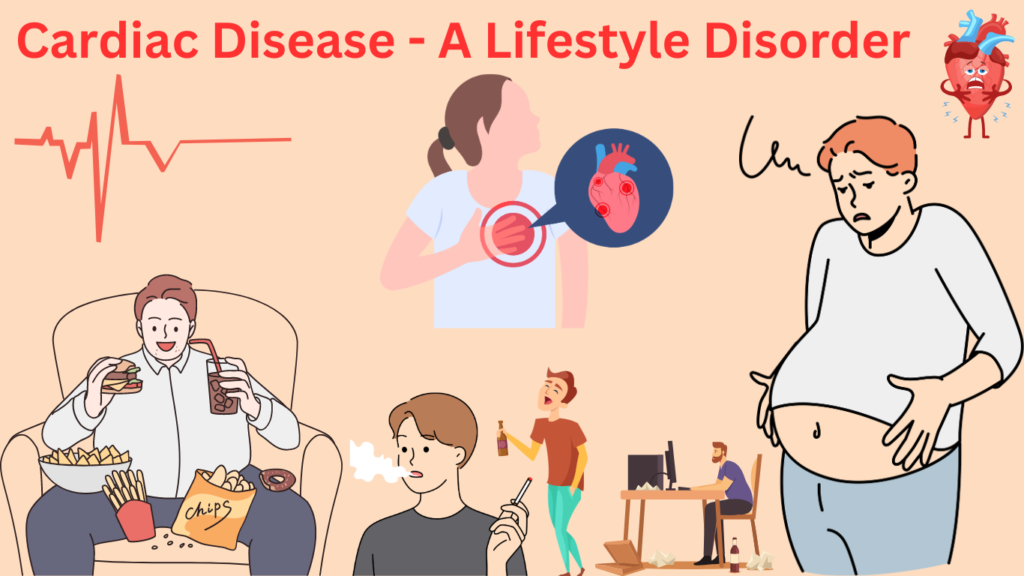
Cardiac Disease - A Lifestyle Disorder
Cardiovascular disease, including conditions such as coronary artery disease, heart failure, and stroke, is often influenced by lifestyle factors. Here’s how lifestyle choices can contribute to cardiac diseases:
1 .Poor Diet:
- High in Saturated and Trans Fats: Diets rich in saturated and trans fats can lead to elevated cholesterol levels, increasing the risk of atherosclerosis (hardening and narrowing of the arteries).
- High Sodium Intake: Excessive salt intake can contribute to high blood pressure, a major risk factor for heart disease.
2 .Lack of Physical Activity:
- A sedentary lifestyle is linked to obesity, high blood pressure, high cholesterol levels, and diabetes – all of which are risk factors for cardiovascular disease.
3. Smoking:
- Smoking is a major risk factor for heart disease. It damages blood vessels, reduces oxygen levels, and increases the formation of plaque in the arteries.
4. Obesity:
- Excess body weight, especially around the abdominal area, is associated with an increased risk of heart disease and other cardiovascular problems.
5. Stress:
- Chronic stress can contribute to heart disease through various mechanisms, including elevated blood pressure, increased heart rate, and unhealthy coping behaviors such as overeating or smoking.
6 .Uncontrolled Diabetes:
- Diabetes increases the risk of heart disease. High blood sugar levels can damage blood vessels over time, leading to atherosclerosis.
7. Sleep Disorders:
- Conditions such as sleep apnea are associated with an increased risk of heart disease. Poor sleep can contribute to obesity, high blood pressure, and other cardiovascular risk factors.
8. Poor Mental Health:
- Conditions like depression and anxiety have been linked to an increased risk of heart disease. Mental health can also influence lifestyle choices, such as diet and exercise.
9. Genetics and Family History:
- While lifestyle choices play a significant role, genetic factors and family history can also contribute to an individual’s predisposition to cardiovascular disease.
Prevention and Management of Cardiac Problems
Healthy Diet and Exercise
Adopting a balanced diet rich in fruits, vegetables, whole grains, and lean proteins can help prevent and manage cardiac problems. Regular exercise, such as brisk walking, swimming, or cycling, is also crucial for maintaining cardiovascular health.
Stress Management Techniques
Practicing stress-reduction techniques, such as deep breathing, meditation, yoga, and tai chi, can help alleviate the negative effects of stress on the heart. Finding healthy outlets for stress, such as hobbies, socializing, and spending time in nature, is equally important.
Regular Health Check-ups
Regular health check-ups, including blood pressure, cholesterol, and glucose screenings, are essential for detecting and managing cardiac problems early on. Routine visits to a healthcare provider can help identify risk factors and develop personalized prevention and treatment plans.
Importance of Awareness and Education
Educating the Public
Raising awareness about the link between lifestyle choices and cardiac health is crucial for promoting behavior change and reducing the burden of cardiac problems. Educational campaigns, community outreach programs, and public health initiatives can help empower individuals to make healthier choices.
Encouraging Healthy Habits
Encouraging healthy habits, such as smoking cessation, limiting alcohol intake, and prioritizing mental well-being, is key to preventing cardiac problems. By promoting a culture of health and wellness, we can create environments that support positive lifestyle changes and improve overall cardiovascular outcomes.
Conclusion
In conclusion, cardiac problems are largely preventable lifestyle diseases that require a multifaceted approach to address effectively. By making healthier choices, managing stress, and prioritizing regular healthcare, individuals can significantly reduce their risk of developing heart-related conditions and enjoy longer, healthier lives.
